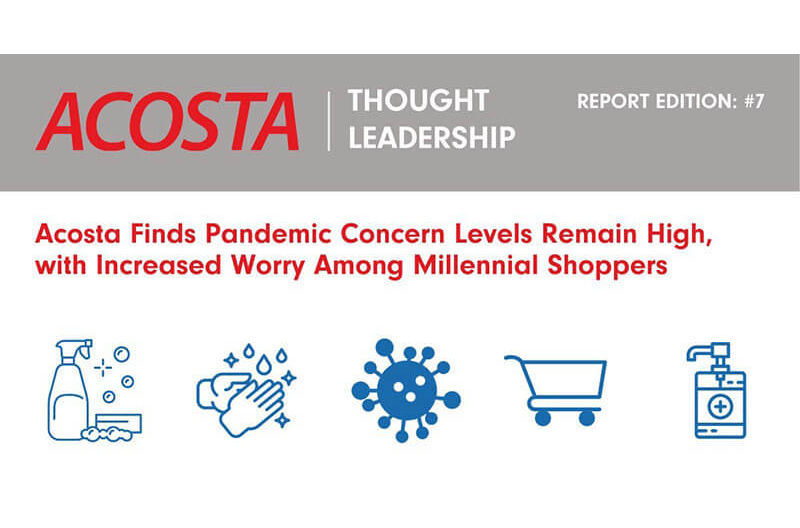Acosta has released its seventh insight report on the continuing evolution of consumer behavior and outlook amid the COVID-19 pandemic. The report, which found many shoppers remain wary of dining in a restaurant as states reopen and restrictions are lifted, also provides suggestions to help retailers seize opportunities to support shoppers and local economies.
“Even as states reopen, most shoppers remain concerned about COVID-19. Half of Millennials surveyed, in fact, are more concerned now than they were at the start of the pandemic,” said Darian Pickett, CEO of Acosta. “Many consumers are particularly hesitant to eat out because they are concerned about social distancing and are preparing more meals at home. Retailers should be prepared to continue meeting dining needs by providing creative meal solutions, like collaborating with local restaurants to supply and sell prepackaged meals.”
Acosta’s seventh COVID-19 research report, gathered via online surveys conducted between May 29 and June 3, provides insight into consumers’ concerns and habits as well as recommendations for retailers, including:
Pandemic concern levels
Overall COVID-19 pandemic concern levels remain high, with 35 percent of shoppers more concerned than they were at the start of the pandemic.
Concern among Millennials has grown the most of any generation, with 50 percent of Millennials more concerned now than they were at the start of the pandemic.
Biggest concerns for shoppers include health/getting the virus (72 percent), a possible second wave and shutdown (65 percent), impact on the economy (56 percent) and household finances (48 percent).
Dining habits
While family meals have resurged – 42 percent are eating more meals together – many shoppers expressed concerns about dining out together.
As states reopen, 12 percent of shoppers plan to dine in a restaurant immediately, 20 percent plan to do so within a few weeks and 68 percent plan to wait a month or longer.
Older shoppers are more concerned about dining out. Of shoppers waiting to dine out, 58 percent are Millennials, 70 percent are Gen X and 76 percent are Boomers.
Grocery store shopping habits
Due to health concerns, shoppers have been cautious about buying food from self-serve and counter-serve areas of grocery stores. Forty to 50 percent of shoppers who previously bought from these areas are buying less often or not at all since COVID-19, due in part to such areas being shut down in many stores.
Forty-three percent of shoppers said they will not or may not go back to the self-serve food bar after the pandemic; 31 percent will not or may not go back to self-serve bulk; and an additional 31 percent will not or may not go back to the store-made to-go area.
New opportunities for retailers
- Provide meal solutions and meal kits to keep busy families eating together.
- Revitalize the center store and frozen sections to fuel the continued increase in at-home meal occasions.
- Initiate foodservice partnerships with local restaurants to offer restaurant-quality meals to those who are not ready to eat out.
- Revamp the prepared food area with less self-serve intervention to win back shoppers. For example, create an online “build-a-meal” option that allows customers to select from a virtual salad bar or taco bar to then pick up from the store.
Acosta’s research was gathered via online surveys using the company’s proprietary shopper community. The report also includes comparison data from online surveys conducted between May 15 and 20, May 3 and 5, April 17 and 23, April 3 and 7, March 20 and 29 and March 6 and 12, 2020. To access the full report, visit acosta.com/news.
Acosta will continue to conduct research and will share updated data and recommendations for retailers and manufacturers on how to best meet consumers’ needs during the COVID-19 pandemic.
Acosta’s previous report, which found working from home may continue for an extended period of time, also provided recommendations to help retailers prepare for post-COVID-19 shelf recovery. See story here.

